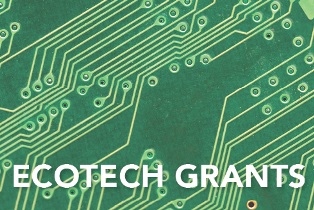When you encourage students nationwide to compete for STEM-focused grants to address environmental problems in their local communities, what happens?
The results of a recent Captain Planet Foundation environmental youth competition highlight some pretty amazing examples of creative, solution-based projects from students in communities from the west’s high desert to the central plains to the Great Lakes!
The whole idea behind the Ray C. Anderson Foundation’s and the Captain Planet Foundation’s special joint EcoTech Grant Program is to encourage students and educators to engage in hands-on, STEM-based environmental education and to re-connect our youth to nature. John Lanier, Director of the Ray C. Anderson Foundation, reiterates, “We want our young people to better understand the natural systems that sustain life and the role they must play in protecting and preserving those systems.”
 Honoring Ray Anderson’s lifelong love of education and spirit of innovation, the Ray C. Anderson Foundation and the Captain Planet Foundation jointly sponsored a nationwide competition awarding EcoTech Grants to schools or non-profit organizations (Boys & Girls Clubs, Girl Scouts, Boy Scouts, nature centers and other youth-related non-profits) that empower youth to create environmental change in their communities. The criteria behind the awards were to engage children in inquiry-based projects in STEM (Science, Technology, Engineering and Math) that were innovative, used nature-based thinking or included new technology.
Honoring Ray Anderson’s lifelong love of education and spirit of innovation, the Ray C. Anderson Foundation and the Captain Planet Foundation jointly sponsored a nationwide competition awarding EcoTech Grants to schools or non-profit organizations (Boys & Girls Clubs, Girl Scouts, Boy Scouts, nature centers and other youth-related non-profits) that empower youth to create environmental change in their communities. The criteria behind the awards were to engage children in inquiry-based projects in STEM (Science, Technology, Engineering and Math) that were innovative, used nature-based thinking or included new technology.
The EcoTech grants were a natural extension of the Ray C. Anderson Foundation’s mission to inspire, educate and connect. Although the Captain Planet Foundation has been fostering critical gap funding for youth environmental education for over 20 years, STEM-focused projects have been rare. Mary Anne Lanier, daughter of Ray Anderson and trustee of the Ray C. Anderson Foundation, adds, “Hands-on environmental education programs that are integrated with STEM learning give students skills and opportunities to think critically and create environmental solutions that matter.”
As a result of funding provided by the Ray C. Anderson Foundation to the EcoTech program, 16 organizations received $2,500 grants, ranging from California to Maine, from Atlanta to Chicago, from Kenab, Utah to New York City. The results have been eye-opening!
Examples of EcoTech projects funded through the Ray C. Anderson Foundation grant include:
EcoTech Underwater Robotic Club: Bringing Ocean Pollution Awareness Above the Surface (Newport Beach, CA)
 Students in this program will build underwater robots (ROVs) and fit them with a video camera to film pollution below the surface of the ocean. Students will film along the coast in Orange County, as well as before and after the annual underwater cleanup event on Catalina Island. Students will learn how to use editing software to consolidate and organize footage captured from cleanup and awareness events. These videos will be shared with others to help understand ocean-related issues and steps all can take to help.
Students in this program will build underwater robots (ROVs) and fit them with a video camera to film pollution below the surface of the ocean. Students will film along the coast in Orange County, as well as before and after the annual underwater cleanup event on Catalina Island. Students will learn how to use editing software to consolidate and organize footage captured from cleanup and awareness events. These videos will be shared with others to help understand ocean-related issues and steps all can take to help.
Source: CPF website - http://captainplanetfoundation.org/2014/01/ecotech/
EcoTech Energy for Synergy (Derby, KS)
Solar and wind turbine lights at Oaklawn Community Garden will provide an opportunity for real-world research and data by students to study alternative energy sources. Students will examine how much stored energy a wind turbine or solar panel can produce on days with more or less wind and sun. They will investigate typical uses of such energy, analyze data to determine what items could be powered with turbines and panels of this size, and calculate how efficient these alternative energies are for home use and how much savings could be realized.
EcoTech York Bison Project: “Spread the word, help the Herd!” (Spring, TX)
Through the creation of a student-led partnership with Caprock Canyons State Park, students at York Jr. High will provide GPS tracking collars that will allow the collection of scientific data to be used in the classroom and by park officials and scientists for the preservation of the historic state bison herd of Texas. The collar technology and software will enable students to track specific bison migration patterns throughout the 14,000-acre park in real time in the classroom. The goal is not only to track the “adopted” bison, but to also bring awareness to the community of the responsibility that the students and all Texas citizens have for the custody and care of these great animals.
“Encouraging children to become environmentally conscious at an early age is not only the right thing to do, it’s the smart thing. Children want to do the right thing. Developing an early personal connection to our planet leads to ethical behavior as successful, adult citizens of our globally connected world.”
Harriet Langford, Ray C. Anderson Foundation Trustee, and daughter of Ray Anderson

Comments